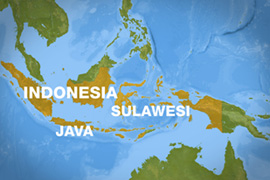Java residents protest over mudflow
Thousands ask for compensation after their homes are submerged.

Numerous efforts to cap the flow have failed and it has become a political issue, amid arguments over whether the drilling or a deadly earthquake two days before, or both, triggered the disaster.
Thursday’s protesters were those who lived in a housing complex about four kilometres from the mud crater.
Their homes were inundated after dykes holding the sludge collapsed following a gas pipeline explosion in November.
The company blamed for the mud flow, PT Lapindo Brantas, has agreed to resettle the residents but they have refused, demanding cash instead.
‘Ready to fight’
Siti Hamimah, a protester, carried a banner reading “We’re ready to fight”.
“Why should we be treated differently from Jatirejo residents? We too want the freedom to choose where to live and what our house should look like,” said a women, referring to villagers first affected by the disaster.
Separately, the team handling the mud flow said it would begin dropping 1,500 concrete balls in clusters linked by metal chains into the mouth of the volcano on Friday.
“This method is intended to reduce the mud flow by choking the hole. Our simulation showed the flow rate could be reduced by between 50 per cent to 70 per cent,” said Satria Bijaksana, a scientist from the Bandung Institute of Technology.
Compensation
 |
| The affected area is in the east of Indonesia’s Java province |
Lapindo has been required by the government to pay $420m to victims and for efforts to stop the mud.
An environmental group has sued Lapindo and Susilo Bambang Yudhoyono, the Indonesian president, over the volcano, demanding the firm bears all the costs.
However, Lapindo and PT Energi Mega Persada, which indirectly controls it, dispute whether the mud flow was caused by its drilling and whether Lapindo alone should shoulder all costs related to the disaster.
The firms are ultimately controlled by the Bakrie Group, the business group of the family of Aburizal Bakrie, the welfare minister.